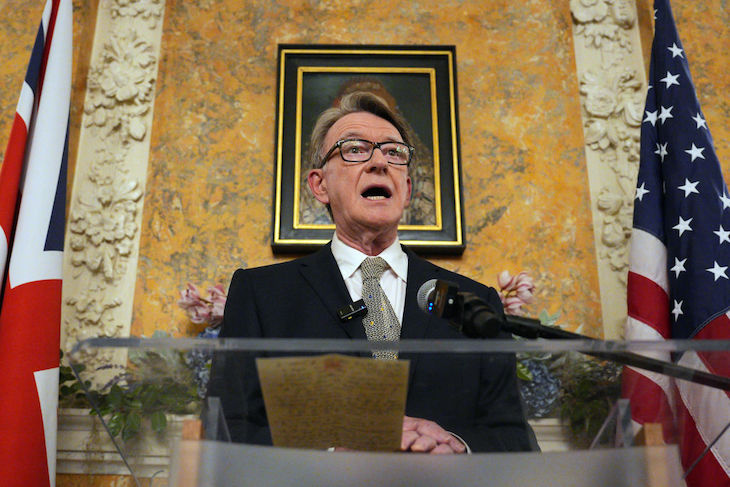Lord Peter Mandelson is to the “Third Way” what Roger Stone is to populism – an alte kameraden from the freewheeling early days. A pinstriped broker and fixer. Whatever ultimately comes of the association with Jeffrey Epstein that has just cost him his job as ambassador to the United States, that such a figure was ever appointed to the role in the first place is telling. It shows that contemporary Britain is an insular sort of place, virtually deaf to the outside world.
To Britain’s political class, Mandelson is something of an in-joke
To Britain’s political class, Mandelson is something of an in-joke. He was one of the principal architects of New Labour, the country’s analog to Clintonism, which brought Tony Blair to office in 1997 with a large parliamentary majority.
Mandelson, a figure of slightly sinister camp, soon earned the sobriquet the “Prince of Darkness,” a notoriety which he seemed to revel in. He was forced to resign from government roles on two occasions. He was also a known boon companion to Epstein. Yet to Britain, Mandelson was simply part of the furniture – the man you loved to hate. It was everywhere implied that this apparently amoral figure, relic of a subtler age, would now be able to in some way “run rings” around the various oik populists – chief among them the 47th president.
All very interesting. But what was any of this supposed to mean to an American audience? The British state seemed to take it for granted that their US counterparts would be familiar with the Mandelson legend; that his past associations would be “priced in” as part of his minatory charm.
Introducing Mandelson as His Majesty’s new ambassador at a reception at the country’s Washington embassy Prime Minister Keir Starmer gave something resembling a best-man speech, full of winks to the audience about “Mandy’s” peccadillos. How the assembled Kentucky senators and Texan cattle magnates were supposed to be familiar with this private lore was anyone’s guess. It was a lot like if American diplomats expected Xi Jinping to have a working knowledge of Rocky and Bullwinkle. That Lord Mandelson would be received, not as a darkly impressive figure, but as simply another client-dupe of Epstein, and a vexing reminder of the scandal to the new administration, never seems to have occurred to Downing Street.
Mandelson is not the only example. Britain makes much of itself as a global entrepot and frets about “Brand Britain” – its stock of soft power. Yet it is a strange and ruminating place. The most popular British TV show of recent years was The Crown, which exhaustively chronicled every single event of the late Queen’s reign, no matter how trivial. Thanks to the legally privileged position of the BBC, Britain is the last developed country on earth that still has something like appointment television. This acts as something of a Chinese Wall, through which little information about the outside world gets in. During Brexit Britain’s political class spent years debating exit models that the EU had already rejected. There was also the strange spectacle of the former Chancellor of the Exchequer George Osborne asking the Chinese to invest in “the Northern Powerhouse,” an economic programme designed to heal regional divides – as if these kinds of cultural conflicts would be of any interest at all to outsiders.
There’s now a sense that all of this is unsustainable. The delicate information “ecology” that the country curates will have to in some sense give way. Britain’s establishment is entitled to maintain figures like Mandelson if it wants to; it is not entitled to carry on as if the rest of the world doesn’t exist.








Comments